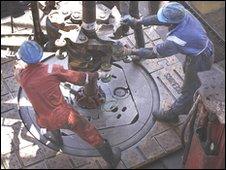Ghana: time to address the oil issue
- Published
15july09.jpg)
Reserves of 800 million barrels of oil have been documented offshore Ghana
Ghana is expected to become a net exporter of oil in 2011, and the announcement of another offshore discovery makes the region look more commercially viable.
As Irish company Tullow Oil reports another find in Ghana's Jubilee field, there are growing concerns about an emerging "oil curse".
Both the Accra government and Ghanaians themselves are well aware of the oil curse, knowing how nearby Nigeria has failed to profit from its enormous wealth.
There is therefore a public demand in the country to avoid anything that resembles Nigeria in Ghana's future oil bonanza.
Chief Nana Kobina Nketsia V of Essikado Sekondi, the area closest to where the oil exists, says much depends on how much leverage the local people can get on revenues.
"Any resource - electricity or coal, can be a blessing or a curse," he says.
"This region happens to be the richest in Ghana in terms of extractive industries, especially cocoa, and yet we suffer abject poverty," he laments.
Corporate or community?
Since oil was discovered off the coast, people are more conscious about whether or not they themselves might benefit, or whether it will only be the oil companies who reap the rewards.
Chief Nana points out that in Nigeria some of the youths were blaming the chiefs for either selling them out or not taking a stronger position with the oil companies.
"We have decided to take a very proactive role," he says.
"You need to get the people involved with the oil so they don't feel alienated, so they feel they are working for part of the profit."
He explains one way how local people can become involved, by addressing the issue of security.
"We have a navy which we hope will get stronger, to command the seas, but we already have canoe fishermen who go all over," he says.
"They are on the seas for two or three weeks in their small canoe. That is part of their culture. Why can't we integrate them into our security system so they can monitor what is going on at sea - give them walkie-talkies so they can send information to a command centre."
He believes that if chiefs and leaders cannot learn from the mistakes of others then they do not deserve the stools they sit on.
"It would be a gross error if the oil company coming in sees itself as a pirate - taking the money and leaving," he says.
"One day it will breed anger, but if we do the right thing it will earn respect."
He states that the world is moving to a stage where people are realising that it is better to cooperate than continuously compete.
He points out that what has happened in the Gulf of Mexico is affecting the whole world - the rich and the poor.
"Each company is a legal entity bred from a particular culture," he says.
"The only good thing about money is when you use it to help humanity. Sitting in a bank that money is a waste," he adds.
Norway or Nigeria model?
Edwin Phillips is already profiting from the recent developments in the area.
He set up a business making wet weather clothes - before the oil was discovered, and he now finds his business is really taking off.
"In the year 2003 I thought about setting up a garment industry to produce wet clothing for people in the area and possibly maybe export," he says.
"Then oil was discovered in 2007. Our turnover has increased because of the orders being made by allied companies providing services to the oil industry."
He appreciates that he may not be able to capture all the market because some companies are bringing in clothes for their workers, but he believes that he will gain a lot more.
"In the first quarter of this year orders have jumped 200% compared to the first quarter of the previous year," he says.
He understands that there is a curse to oil as well.
"If we take the Nigerian example, it was the leading producer of palm oil but all of a sudden when they found oil, they stopped and imported everything," he says.
He believes that Ghana should use 40% of its oil revenue to improve its infrastructure.
"I think Ghana is going the Norwegian way," he says, referring to how Norway has invested its oil revenue for future generations.
Uncertain future

Only a limited number of local people will find work on the oil rigs
Mr Phillips is benefiting from the early stages of the boom but there is wariness too.
Along the coast in Nigeria there is violence and kidnappings, and the resentment of poor people sitting on top of the massive wealth that passes them by in pipes.
One college student says she just sees an increase in traffic and an increase in the number of foreigners around.
"I see people being ejected from their homes because landlords are now demanding higher prices for rent," he sighs.
"There is a fear that a time will come when the locals will have to move to make way for the new rich class."
Furthermore, she feels that the coming of the oil has changed the ambitions of her fellow students, but few of them feel they will have any chance to prosper.
"Even if we have the skills to work for the oil companies, it is about who you know in Ghana," she says.
That is a particular worry for her as the oil companies come from outside the country.